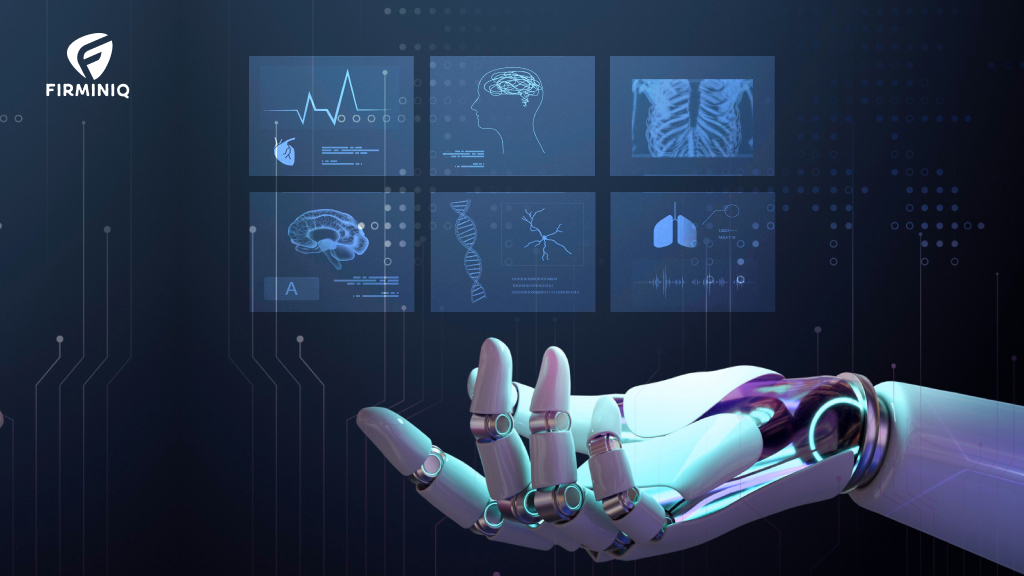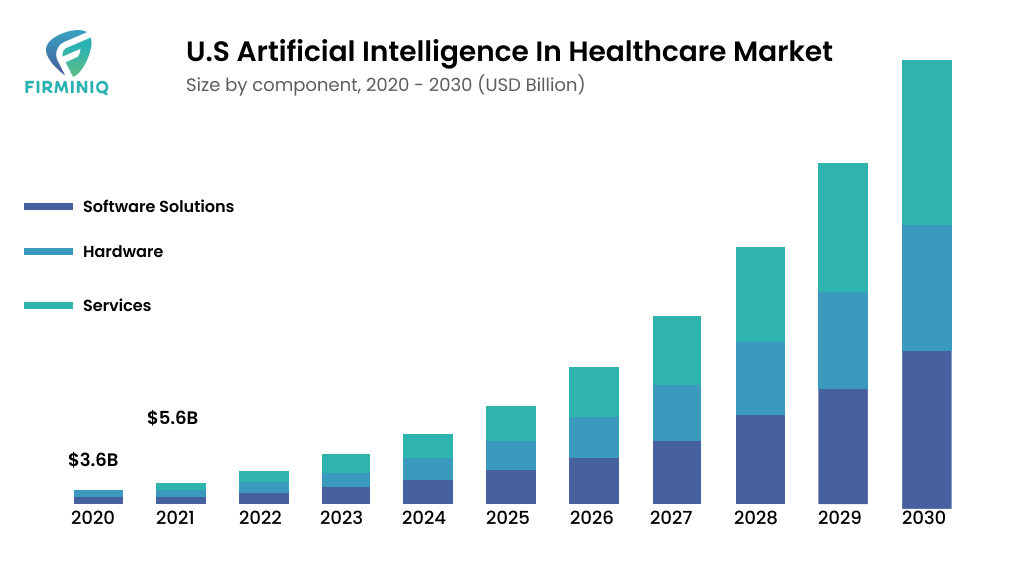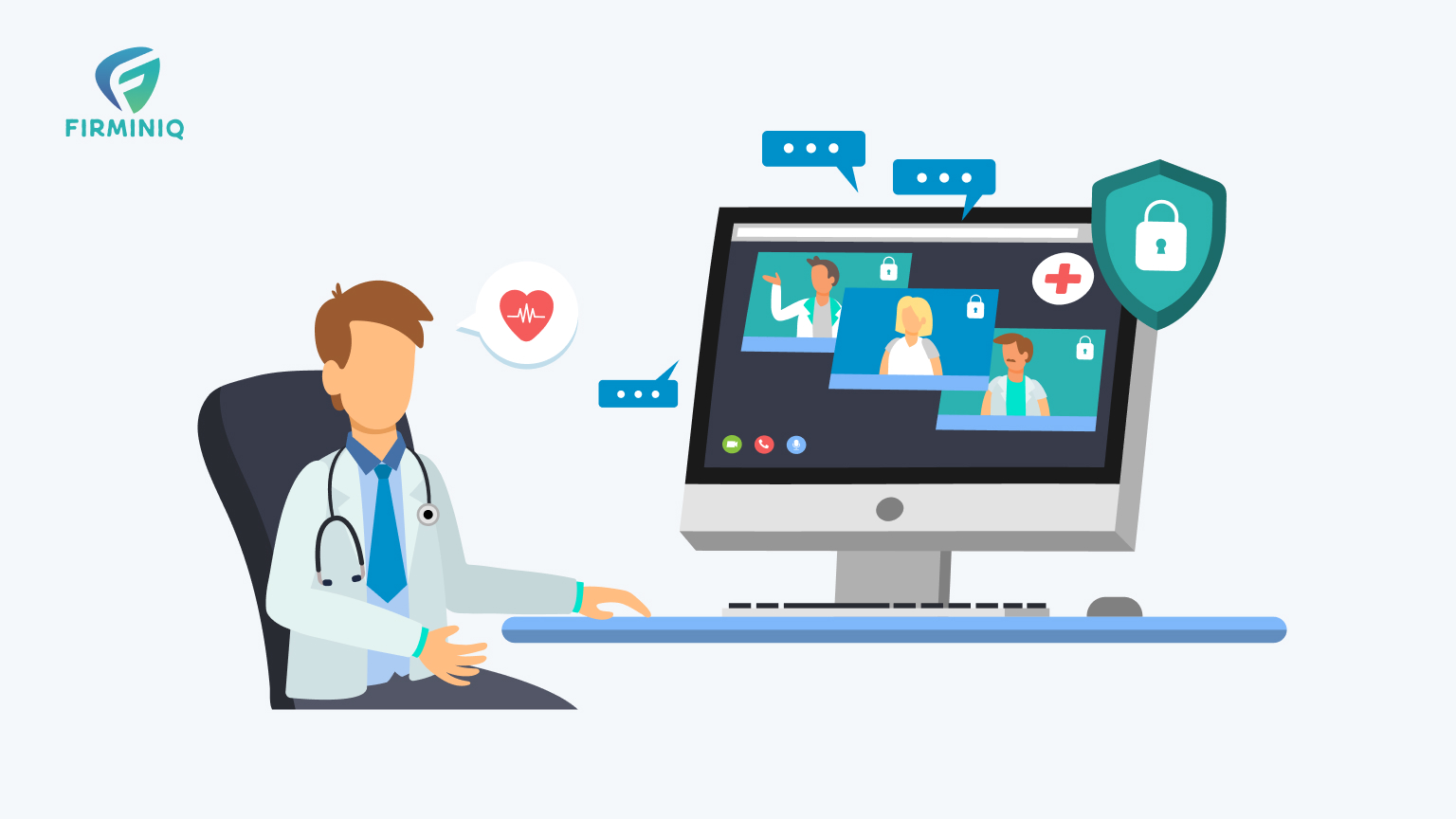In the ever-evolving healthcare landscape, Artificial Intelligence (AI) and Machine Learning (ML) have paved the way and offer many opportunities. The technologies have the potential to revolutionize patient care and provide personalized treatment and diagnosis while ushering in a new era of precision and efficiency.
As per Grand View Research, the global AI (Artificial Intelligence) in healthcare market size was valued at USD 15.4 billion in 2022 and will expand to a compound annual growth rate of 37.5% by 2030. The AI/ML algorithms are integrated into the healthcare system to predict the patient in an early stage based on the dataset.
Yes, data in healthcare is pivotal as it fuels algorithms, resolves complex patterns, and helps organizations to make insightful decisions. As the healthcare industry continues to generate a vast amount of data (from Electronic Health Records to imaging and more), the need for effective data sharing becomes even more critical.
While EHR (Electronic Health Records) is considered one of the most valuable and reliable sources of patient data, it may not offer a complete picture of an individual’s health journey. The EHR is limited to data collection within a specific healthcare organization. Data sharing from multiple sources encourages collaboration across stakeholders and allows healthcare professionals to make more informed decisions. AI/ML relies on the datasets to learn about the patterns leading to better predictive capabilities and make the right decisions.
Leveraging data, AI/ML applications can contribute to improved clinical decision making, personalized medicine, and offer predictive analysis and proactive intervention. Let us dig deeper and explore the role of data in shaping the future of AI/ML in healthcare with the potential it holds and the right possibilities.
Leveraging Data Sharing from Diverse Sources to Build a Comprehensive Landscape
From individual patients and healthcare providers to researchers, policymakers, and public health agencies, there are different stakeholders involved in healthcare. However, relying on data from a sole source is often inadequate to derive comprehensive insights and make informed decisions. Data from multiple sources is the key to building robust AI models and secured data sharing allows data collection from multiple sources that helps to make informed decisions. Here are the ways in which it helps:
1. Data Integration from Multiple Sources
Limited data within a single system is unable to detect and share a complete picture of a patient’s health and details like history, lab test results, and lifestyle factors. With the lack of vital information, the physician might not understand the patient’s condition leading to gaps in the diagnosis and further treatment. AI/ML plays a key role here as it requires data integration from multiple sources. Artificial Intelligence and Machine Learning algorithms prosper on the datasets and offer better results.
2. Get a Holistic View of Patient Health
Each healthcare provider or application may have access to only a portion of a patient’s medical history. Therefore, integrating data from multiple sources offers a holistic view of healthcare, that enables a comprehensive understanding of patients, diseases, and the entire ecosystem. With an integrated view of the patient data, the healthcare providers get the complete history of the patient, previous treatment, medications, and the right test results. The perspective supports personalized and coordinated care.
3. Informed Decision-Making
When the data is shared securely from various sources, it allows them to make informed decisions. Healthcare providers get access to comprehensive patient data that offers them a complete picture of patient history. They can therefore develop effective treatment strategies and monitor patient progress. Also, the policymakers and administrators can make the right decisions about the policies, resource allocation, and population health management.
4. Add Value to Healthcare Professionals
Having a comprehensive dataset enables the healthcare professionals to get all the valuable insights and choose the appropriate treatment without wasting any time. The professionals can feel much more confident in the treatment and use their expertise, benefiting both the providers and patients.
5. Patient Empowerment
When patients have access to their personal healthcare information, they can actively engage in discussions with healthcare providers and other stakeholders. Also, it helps them to make more informed decisions about their treatment options and lifestyle choices. They become active participants in their healthcare journey.
6. Improved Predictive Models
Data from multiple sources allows healthcare organizations and researchers to access a larger pool of patient data. The diversity enhances the data sets used for predictive modeling leading to more improved models.
7. Maintaining Trust and Reputation
Trust is the foundation of the robust patient-provider relationship that influences the patient’s loyalty, satisfaction, and the organization’s reputation. When stakeholders, including patients, healthcare providers, partners, researchers, and regulators, trust an organization’s data-sharing practices, it fosters collaboration. If data is shared insecurely and a data breach occurs, it can severely damage the organization’s reputation and erode trust
Challenges Associated with Data Sharing in Healthcare and How to Overcome Them
Here are some significant challenges associated with data sharing in healthcare along with the ways to overcome them. Let us dive into each one of them:
1. Data Accuracy
from the devices may not be accurate in terms of quality and reliability. Inaccurate data may lead to false results, analysis, and wrong conclusions leading to compromised patient care.
Therefore, following the standard protocols, quality control measures, educating users on device usage, using approved, regulated medical devices only, and proper data collection techniques can help eliminate such errors and ensure the data shared is accurate.
2. Data Validity
Data validity is the relevance of data for the purpose it is collected. Ensuring that the data collected is shared appropriately for the intended purpose and is aligning with the specific requirement is vital.
Automatic and real-time data sharing in healthcare can significantly benefit physicians and other healthcare professionals by providing them with timely access to relevant patient information. However, with the manual data sharing process, there is a delay in data sharing that may lead to errors and other inefficiencies. Automating data wherever possible can help address these challenges.
3. Data Privacy and Consent Across Systems
Data privacy and consent across systems is vital to ensure confidentiality, one of the most vital considerations for data sharing. Health data must be shared securely and comply with privacy regulations.
Addressing the data privacy concern needs a suite of technological solutions, regulatory policies, training and education and robust governance framework.
Let us discuss some of the key considerations for data privacy.
a. Data Encryption and Security
When the data is shared among systems, ensuring it is encrypted helps protect it from unauthorized access by the third party. With the right security measures, access control, user authentication are a few measures that help safeguard data and ensure robust security.
b. Purpose Limitation of Data
Data should be used for the purpose that has consent or is permitted. Healthcare organizations should have clear guidelines on the acceptable use of shared data and ensure compliance.
c. User Education and Training
Users must be educated on the importance of data sharing, how to do it efficiently, and most importantly the associated privacy considerations. Also, understanding of how their data will be used, who will have access to it, measures for their data protection and more is important.
d. User Consent and Approval
User consent must be taken before their data is shared. Users must be able to offer consent for the specific purposes and be able to withdraw it anytime. A clear and transparent mechanism for managing user consent is important.
e. Users to Seamlessly Manage their Data
Allowing users to manage their data across multiple systems or third parties is crucial. With user-centric tools and platforms, users can easily access, modify, or delete data across different healthcare providers and systems, with great control over their data.
f. GDPR and CCPA Issues
The regulatory frameworks like GDPR (General Data Protection Regulation) and CCPA (California Consumer Privacy Act) offer privacy protection in healthcare, but complying with these regulations can be complex especially for the organizations on a global scale or the ones having multiple regulatory frameworks.
Ensuring compliance with these regulations requires careful consideration of privacy regulations, security measures, and compliance practices.
4. Security
Fortified Health Security’s mid-year report stated that the healthcare sector suffered 337 breaches in the first half of 2022 alone. Data security has always been a challenge as it contains the user sensitive health information.
Therefore, implementing robust security measures (data encryption, controlled access, secure data transfer protocols) becomes necessary to protect data from breaches and attacks from third parties and unauthorized access.
5. Technical Challenges
Tech challenges like interoperability issues, legacy systems, and fragmented data infrastructure pose challenges to seamless data sharing. To address these challenges, a multi-faceted approach that involves standardization efforts, interoperability frameworks, legacy system modernization and collaboration with stakeholders is vital.
Adopting robust standardized formats, APIs (Application Programming Interfaces), and interoperability standards offers better connectivity and makes data exchange seamless among healthcare ecosystems.
Winding up
Data-driven AI/ML applications in healthcare has revolutionized healthcare, however addressing the data security challenges like privacy, quality, and sharing with ethical sources has always been a challenge.
If you are looking for data security and interoperability services in the healthcare domain, you can rely on FIRMINIQ, and ensure your healthcare data is secure!
Also Read: Securing Patient Data in Remote Patient Monitoring: A Comprehensive Guide to Compliance
Your feedback is crucial to us, and we genuinely appreciate your time in sharing your thoughts. Leave us a comment.








